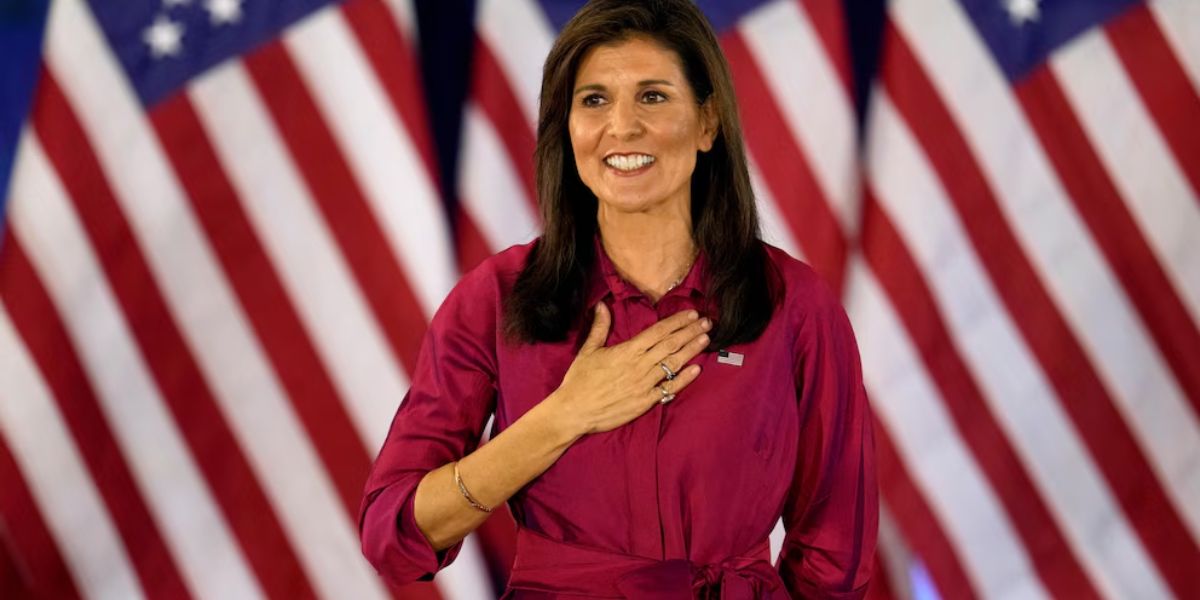Nikki Haley Won 20% of the Vote in the Presidential Primary: What Does This Mean for Indiana’s GOP?
Despite her withdrawal from the race in March, soon before Donald Trump won the Republican nomination, the ghost of Nikki Haley’s presidential campaign is gaining major traction in state primaries.
The support for Haley, most notably in Indiana, where she received more than 21% of the vote on Tuesday, reflects ongoing dissatisfaction among party voters with the former president. He is picking up primary victories despite spending much of his recent time in a New York courtroom facing state criminal charges for hush money payments to a porn performer.
Haley, the former South Carolina governor and UN ambassador who qualified for the Indiana ballot before abandoning her campaign two months ago, has not endorsed Trump. A Haley campaign adviser did not immediately respond to a message seeking comment on the results.
Indiana Democrats did not have the option of voting “uncommitted” in their party primary. Unease about President Joe Biden’s handling of the Israel-Hamas conflict has sparked a protest vote campaign in some states, prompting similar concerns about his support in November.
Haley’s popularity was strongest in Indiana’s metropolitan and suburban areas. She received 35% of the vote in Indianapolis’ Marion County and more than one-third of the vote in nearby Hamilton County. As in other states, she performed best in the most Democratic sections of the state. The exception was Lake County, which includes Gary, just south of Chicago. Haley received only 14% of the votes in Lake County.
Biden’s campaign ascribed Haley’s Indiana performance to Trump’s struggles in the suburbs, citing comparable primary results in swing states such as Georgia, Michigan, and Pennsylvania. Trump has made an open pitch to Haley’s fans to vote for him in November. The Trump campaign stated, without evidence, that Haley’s support came from Democrats, and that he would win Indiana in November, as he had in 2016 and 2020.
Two weeks ago, Haley garnered nearly 17% of the Pennsylvania primary vote. She received comparable backing in Arizona, barely weeks after her departure. Trump, who carried every Indiana county, dismissed Haley’s endorsement in a Tuesday interview with Lancaster, Pennsylvania’s WGAL-TV.
“All of those people are going to come to me,” stated the man.
In late January, Trump stated prematurely that Haley did not have enough signatures to appear on Indiana’s primary ballot. While Haley received the required 500 signatures in each congressional district to make the ballot, the margin was razor thin in the 7th District, which encompasses Indianapolis.
Even as Haley was running, her campaign remained virtually absent from the state.
Indiana, having only 11 electoral votes, is not a swing state like Pennsylvania. Trump won Indiana by 16 percentage points in 2020. Nonetheless, Haley’s support from one-fifth of Republican voters raises issues about how they would vote in the fall. Before dropping out, she received approximately 27% of the votes in Michigan. She garnered 13% of the Georgia GOP vote shortly after her departure.
Haley, who stopped her campaign in early March after losing nearly all Super Tuesday states to Trump, recently announced that she would join the Hudson Institute, a conservative Washington think organization. In her goodbye speech the day following Trump’s big night, Haley refused to directly support him. She put the onus on Trump to gain the support of moderate Republicans and independent voters who had previously supported her.
“It is now on to Donald Trump to win the votes of those in our party and beyond who did not support him. “And I hope he does,” she added. “At its finest, politics is about attracting people to your cause, not alienating them. And our conservative cause desperately needs additional people.”
Trump had been harshly critical of Haley, referring to her as “Birdbrain” in addresses to his supporters and questioning her decision to remain in the campaign. Just before Super Tuesday, Haley stated that she no longer felt obligated to a vow that required all GOP candidates to endorse the party’s ultimate nominee in order to participate in the primary debates.
She has said little in public, but she has continued to use her email outreach through her Stand for America PAC, sending out updates on her Hudson appointment as well as the return of her husband, Michael, from a South Carolina Army National Guard deployment that saw him stationed in Africa for much of her primary campaign.











